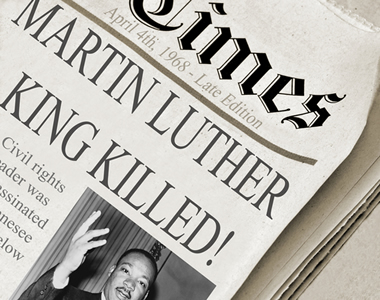

The book excerpt describing King’s assassination and
the events leading up to it brought thoughtful responses from readers who
reflected on the civil rights leader’s contributions to racial equality in the U.S.
The excerpt from Taylor Branch’s biography of Dr.
Martin Luther King Jr. (Jan. 9) was superb. It helped show the personal side of
the man. I disagree, however, with Jesse Jackson, who in Time’s forum, “What If
He Were Alive Today?”, said that King would be challenging the war in Iraq U.S.
actions in Iraq U.S.
Robert D. Festenstein, Wyoming , Ohio
In 1963 Time
selected King as Man of the Year. In 1964 he was awarded the Nobel Peace Prize.
A man of superior intelligence, King was a passionate crusader for complete
justice for all people and an extraordinary leader. Americans observe a
national holiday in his honor. It grieves me deeply, therefore, that you felt
it necessary to print references to his extramarital affairs, which can only
diminish his stature. I am not disputing the information in the excerpt. I am
only lamenting the fact that so many people seem to find it necessary to expose
the clay feet of our heroes.
(The Rev.) Louis Gerhardt
Twenty-nine Palms, California
King’s commitment to nonviolence convinces me that he
would abhor all the bloodshed and strife that besiege America U.S. South Africa
Brien Comerford
Read the text above and use the following code for questions 1 to 5:
a) if only one of the statements is correct;
b) if two statements only are correct;
c) if all three statements are correct;
d) if none of the statements are correct.
1. I. Robert Festenstein liked the biography Taylor Branch wrote
about Martin Luther King Jr.
II. In his opinion, if King were alive today he would
be frustrated to see that his dream of social justice and equality in the U.S.
III. According to Robert Festenstein, Martin Luther
King Jr. never gave much attention to the war in Iraq
2. I. Louis
Gerhardt does not believe that there should be a national holiday in Martin Luther King Jr.’s honor.
II. He contests the information
presented in the excerpt.
III. In his opinion, certain details of
King’s private life ought not to have been mentioned.
3. I. To Brien Comerford, Martin Luther King
Jr. would strongly condemn American society nowadays if he were still alive.
II. He thinks King left a void which
has not been filled by any black or white civil rights activist in America
III. In his opinion, Nelson Mandela and
Desmond Tutu have been deeply influenced by King’s ideas.
4. I. The conjunction however in “I disagree, however, with
Jesse Jackson” is equivalent to nevertheless.
II.
The word therefore, which appears in
“It grieves me deeply, therefore, that you felt it necessary to print
references to his extramarital affairs,” normally introduces a conclusion.
III.
The verb dispute in “I am not
disputing the information in the excerpt” cannot be translated into disputar.
5. I. The opposites of the words show (It helped show the personal side
of the man), alive (“What If He Were
Alive Today?”) and failure (the
failure of his dream of social justice and equality in this country) are,
respectively, exhibit, dying and succeed.
II.
When you say that someone has clay feet, you mean that he or she is very
seriously ill.
III.
The words abhor, bloodshed, strife and besiege, which appear in “King’s
commitment to nonviolence convinces me that he would abhor all the bloodshed
and strife that besiege America


Nenhum comentário:
Postar um comentário